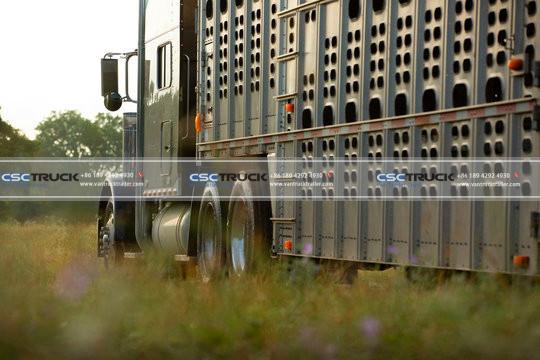In a groundbreaking development for Falkland Islands’ agriculture, the introduction of livestock trailer delivery is set to revolutionize transportation methods, heralding a new era of efficiency and sustainability in the industry.
For years, farmers in the Falkland Islands have grappled with the logistical challenges of transporting livestock across the archipelago’s diverse terrain. With rugged landscapes and scattered farms, traditional methods of animal transportation, such as using boats or helicopters, were not only costly but also often impractical and time-consuming. However, the recent adoption of specialized livestock trailers marks a significant step forward in streamlining agricultural transport operations.
The implementation of livestock trailer delivery offers several notable advantages to the Falkland Islands’ farming community. Firstly, it provides a cost-effective and efficient means of transporting livestock between farms and markets. Unlike helicopters or boats, which incur high operational expenses, the use of trailers significantly reduces transportation costs, allowing farmers to allocate resources more efficiently and invest in other areas of their operations.
Moreover, livestock trailer delivery enhances animal welfare standards by minimizing stress during transit. The trailers are equipped with advanced ventilation and safety features, ensuring that animals remain comfortable and secure throughout the journey. This not only improves the well-being of the livestock but also translates into higher-quality meat and dairy products, meeting consumer demands for ethically sourced produce.
Additionally, the introduction of livestock trailers promotes environmental sustainability in the Falkland Islands’ agricultural sector. By utilizing overland transportation methods, the carbon footprint associated with animal transport is significantly reduced compared to air or sea freight. This aligns with global efforts to mitigate climate change and demonstrates the islands’ commitment to adopting eco-friendly practices in agriculture.
Furthermore, livestock trailer delivery fosters economic growth and resilience within the Falkland Islands’ agricultural industry. By facilitating the movement of livestock to markets and processing facilities in a timely manner, this innovation supports the local economy and enhances food security. Additionally, it creates employment opportunities within the transportation and logistics sectors, further contributing to community development and prosperity.
While the adoption of livestock trailers represents a significant advancement for Falkland Islands’ agriculture, challenges remain in ensuring the smooth operation and maintenance of this new transportation infrastructure. Adverse weather conditions and rough terrain can pose logistical hurdles, requiring ongoing investment in equipment and infrastructure upgrades to optimize efficiency and reliability.
In conclusion, the introduction of livestock trailer delivery stands as a landmark achievement in enhancing agricultural transport in the Falkland Islands. By offering a cost-effective, efficient, and environmentally sustainable solution to livestock transportation challenges, this innovation promises to elevate the productivity and resilience of the islands’ farming sector. With continued investment and collaborative efforts, the Falkland Islands are poised to reap the benefits of this transformative technology for years to come.

